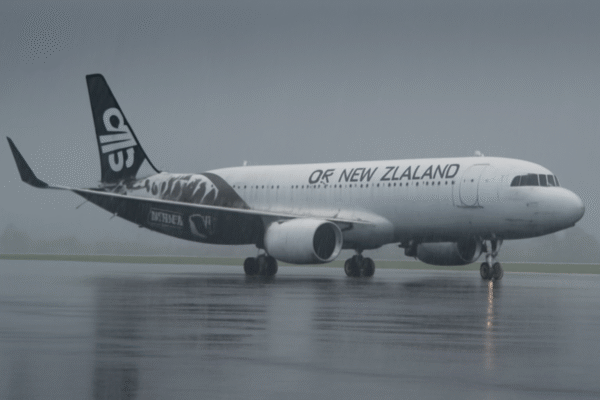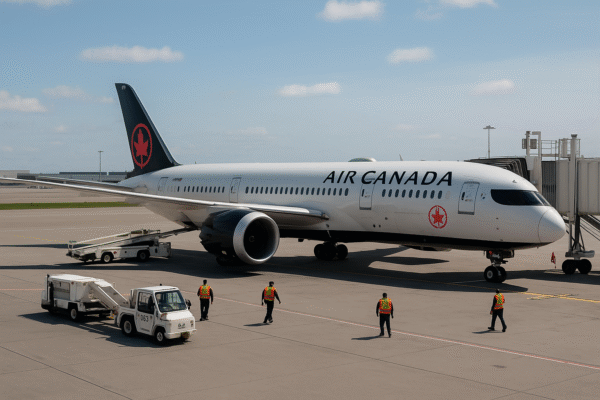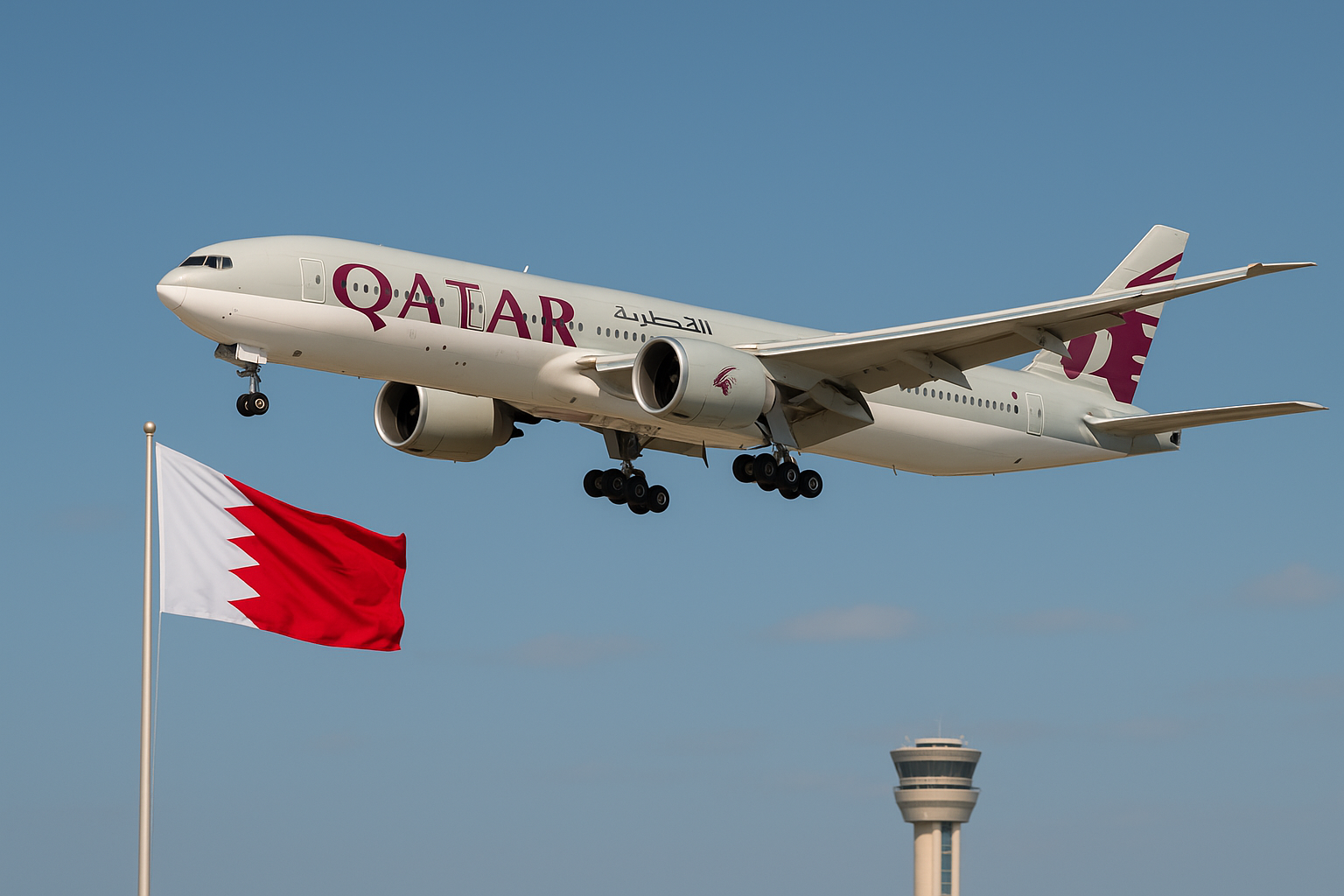Bahrain Seals Airspace After Iranian Strikes on U.S. Bases in Qatar and Iraq, Disrupting Gulf Aviation and Heightening Regional Tensions
In a sharp escalation of tensions in the Gulf, Bahrain has closed its airspace following coordinated Iranian missile attacks on American military bases in Qatar and Iraq. The strikes, which targeted the strategic Al-Udeid Air Base in Qatar and another U.S. installation in Iraq, have significantly disrupted civilian air traffic across the Persian Gulf and stoked widespread concerns about regional aviation safety and geopolitical stability.
Although Bahrain’s Civil Aviation Affairs department has not released an official NOTAM (Notice to Airmen), real-time flight tracking platforms such as Flightradar24 show a dramatic drop in commercial activity over the kingdom’s airspace. This silent but assertive move is widely interpreted as a preemptive security measure in response to the increasing threat of conflict spillover.
Flights Rerouted, Delays Mount Across the Gulf
Bahrain’s strategic position in the Gulf means its airspace is a vital corridor for flights connecting Europe and Asia. The closure has forced dozens of airlines to make rapid route changes, redirecting flights through Saudi Arabia and Oman, leading to extended journey times and significant scheduling disruptions. Flights departing from or arriving in major hubs such as Dubai, Doha, Riyadh, and Abu Dhabi are experiencing cascading delays.
Several global carriers—including Emirates, Qatar Airways, Lufthansa, and British Airways—have confirmed route adjustments and are advising passengers to check for schedule updates. Aviation authorities across the Gulf region, including in the UAE and Saudi Arabia, have also heightened monitoring of their own airspace amid fears of further conflict escalation.
Iranian Missile Strikes Amplify Risk to Civil and Military Targets
The airspace restrictions stem directly from Iran’s latest missile strikes, which Iranian officials describe as a “measured response” to perceived U.S. aggression. Multiple ballistic missiles were reportedly launched at the Al-Udeid Air Base—home to thousands of U.S. personnel and serving as a logistical hub for American military operations in the Middle East—and at another key U.S. military site in Iraq.
While initial assessments of physical damage remain undisclosed, U.S. Central Command has confirmed increased security alerts and the implementation of heightened defensive measures at all forward-deployed sites in the region. No civilian casualties have been reported, but the scale of the strike represents one of the most direct Iranian attacks on U.S. infrastructure in recent years.
Bahrain’s Tactical Silence: A Calculated Move?
Bahrain, which hosts the U.S. Navy’s Fifth Fleet in Manama, finds itself in a uniquely sensitive position amid the unfolding crisis. While its aviation authority has remained silent publicly, aviation analysts believe the decision to close national airspace is a calculated one. By avoiding an immediate public declaration, Bahrain may be seeking to prevent panic while simultaneously protecting commercial and military aviation from becoming inadvertent targets.
Historically, Bahrain and other Gulf Cooperation Council (GCC) nations have adopted similar security measures during periods of heightened tension—such as the 2019 Gulf tanker attacks and the January 2020 U.S.-Iran confrontation. Each of these events saw temporary airspace restrictions and the rerouting of international flights to ensure passenger and crew safety.
Civil Aviation at a Crossroads
The ripple effect of Bahrain’s decision is being felt far beyond the Gulf. With a significant number of long-haul international flights—particularly between Europe, South Asia, and Southeast Asia—relying on safe passage through the Gulf, airlines are now reevaluating their route maps. Some are considering longer detours over the Red Sea or Central Asia, which can add hours to travel time and increase fuel costs.
Global aviation organizations, including the International Civil Aviation Organization (ICAO) and IATA, have issued advisories encouraging operators to exercise extreme caution and monitor geopolitical developments closely. Aviation insurers, meanwhile, are already signaling potential surcharges for overflights through high-risk zones, which could translate into higher ticket prices for travelers.
Energy and Economic Fallout Looms
Beyond aviation, the geopolitical fallout of Iran’s missile strikes and Bahrain’s airspace closure could reverberate across global markets. The Persian Gulf is not only a crucial air route but also one of the world’s most critical maritime corridors for oil and LNG shipments. Any escalation in military activity risks disrupting shipping lanes, potentially impacting global energy prices.
Bahrain’s move, while defensive in nature, reflects deepening anxiety among Gulf nations over their proximity to increasingly direct military confrontations. Its longstanding alliance with the United States and geographical proximity to Iranian missile range make it particularly vulnerable to regional flare-ups.
Regional Coordination Underway
Sources from Gulf diplomatic channels suggest that emergency coordination is underway between civil aviation regulators from Bahrain, Qatar, the UAE, and Saudi Arabia. While Bahrain has led the airspace shutdown, other Gulf nations are preparing contingency protocols, including re-routing strategies and potential closures, should the situation escalate further.
The United States, meanwhile, has reaffirmed its commitment to regional allies, with Pentagon officials stating that any threat to U.S. forces or their host countries will be met with a “firm and proportional” response.
Passengers Advised to Stay Updated
Passengers with travel plans involving the Middle East are being urged to stay in close contact with airlines and monitor advisories. Industry experts warn that flight disruptions could persist for days or even weeks, depending on whether the military situation stabilizes or worsens.
As tensions between Iran and the U.S. show no immediate signs of easing, Bahrain’s airspace closure marks a sobering development for both the global travel industry and regional diplomacy. In a region where the skies are a vital artery for commerce, connectivity, and culture, this unfolding crisis threatens to redraw the aviation map—at least temporarily.
For more travel news like this, keep reading Global Travel Wire



















